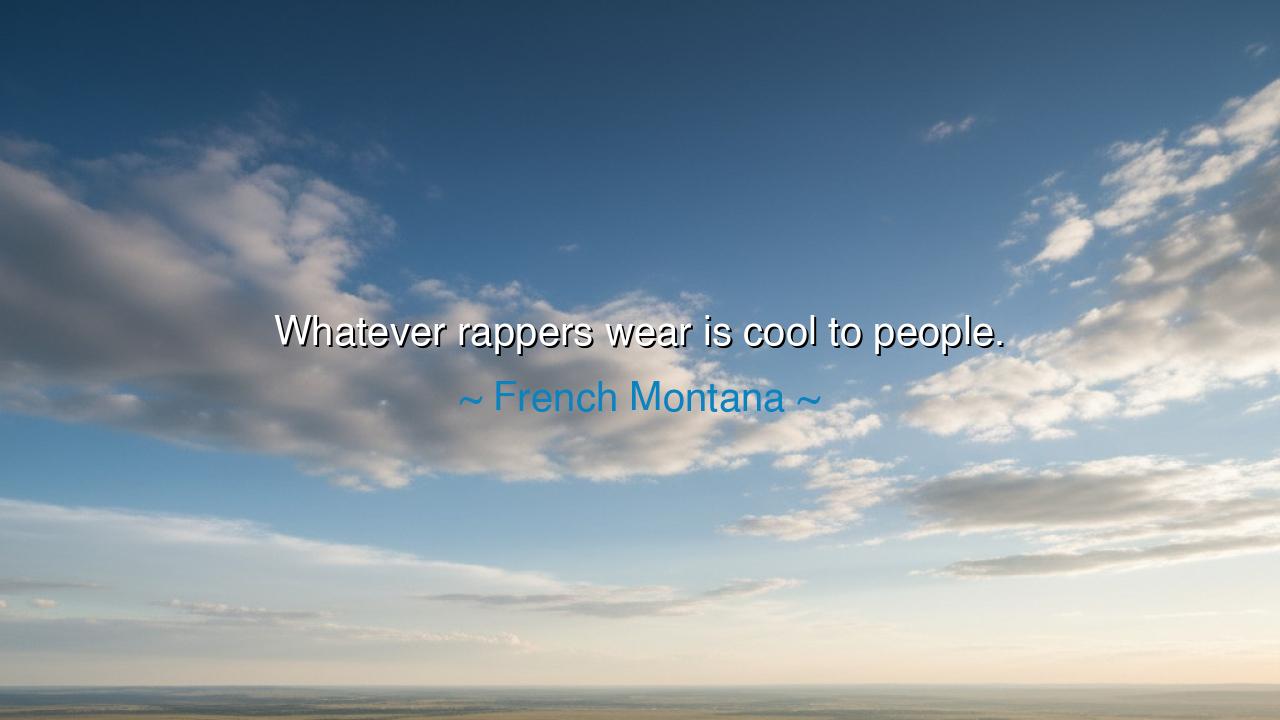
Whatever rappers wear is cool to people.






In the ever-changing realm of fashion and culture, there is a timeless truth that rings out: the influence of those who lead society's narratives can shape the very ideals and norms of a generation. French Montana, in his assertion, "Whatever rappers wear is cool to people," speaks to the profound power of influence, how the choices and styles of one group can permeate the fabric of society and become a beacon of what is considered desirable. This is not just a statement about fashion; it is a recognition of the broader cultural forces at play—the ways in which identity, creativity, and status can be projected through the medium of appearance, and how society gravitates toward those who embody these qualities.
In the ancient world, the most powerful figures were not merely warriors or kings; they were symbolic leaders, whose every action and appearance were scrutinized and emulated by the masses. The Roman emperors understood this deeply. Take Augustus, for example, whose image, from his clothing to his posture, was carefully crafted to project an aura of power, control, and divinity. His appearance, his clothing, and his style became synonymous with leadership. The people looked to Augustus not just for political guidance, but as a figure who represented the ideal of what it meant to be successful and influential. His choices, like the clothes he wore, were more than fashion—they were statements of authority that permeated the culture of Rome. Similarly, French Montana’s words reveal how rappers, through their authenticity and boldness, have come to shape the modern era's understanding of what is cool, powerful, and worthy of admiration.
Throughout history, leaders and heroes have influenced the culture around them, particularly through the choices they made in what they wore. In ancient Greece, Alexander the Great set the standard for what it meant to be a conqueror not only through his battlefield successes but also through his image. His armor, his cloak, and his posture were carefully designed to convey both strength and divinity. Alexander’s appearance was as much a weapon as his sword, for it instilled awe in his enemies and admiration in his followers. What he wore became synonymous with power and victory, and in this way, he became not just a conqueror of lands, but of minds as well. In modern times, rappers like French Montana understand this principle, recognizing that their style is not just about clothes, but about projecting an identity, a culture, and a movement that others aspire to be part of.
Consider also the knights of the medieval world, whose armor was as much about symbolism as it was about protection. The chivalric code was embodied not only in their deeds but in the intricate details of their armory—their crests, their colors, their designs spoke of their lineage, their honor, and their power. The armor itself became a representation of what they stood for, just as the clothing of modern icons becomes a statement of who they are and what they represent. In this, we see how, much like the knights of old, rappers today shape the world around them not just by their words, but by the very aesthetic they present. The clothes, the jewelry, the hats—they are all part of a larger narrative that defines their place in society and influences those who follow.
French Montana’s words are a testament to the modern power of self-expression through fashion and style. But there is a deeper truth embedded in his statement. It speaks to the ever-present reality that those who dare to be authentic in their expression—whether through music, art, or fashion—will inevitably shape the cultural landscape. Like the philosophers of ancient times who sparked thought with their ideas and appearance, so too do rappers influence the culture with the energy they project through their fashion. Their choices become a form of leadership, one that shapes the tastes and desires of their followers, influencing not just what is worn, but what is valued and desired by society at large.
The lesson here is powerful and timely: authenticity and self-expression have the potential to shape not just the individuals who embody them, but the very world around them. What we choose to wear, how we choose to present ourselves to the world, speaks volumes about our identity and our influence. Just as ancient leaders knew the power of their image and style, so too should we recognize that our choices in appearance and self-presentation carry great weight in how we are perceived and how we can influence those around us. French Montana’s statement is a call to embrace our power to shape culture, to understand the influence we hold, and to use that influence to project authenticity, strength, and individuality.
Let us then, as individuals, embrace the lessons of history, and recognize that we too have the ability to shape the world through the way we present ourselves. Whether through fashion, art, or music, we hold the power to influence the future of culture and identity. Let us be mindful of the power we wield and use it to create a world that values authenticity, creativity, and individual expression. As French Montana has so eloquently pointed out, the way we express ourselves can shape the world—not just in the present, but in ways that will last for generations to come.






AAdministratorAdministrator
Welcome, honored guests. Please leave a comment, we will respond soon